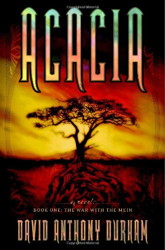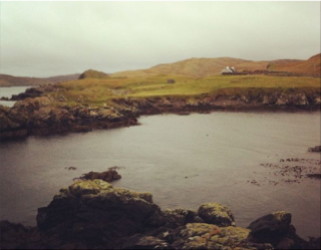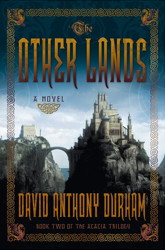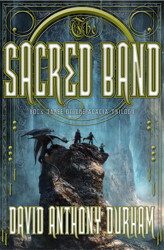
This week, I’m very pleased to bring you another member of that select group of authors, a winner of the Campbell Award. David Anthony Durham took the prize before I started showcasing the nominees here each year, but he was so gracious when I invited him to participate last month, I have no doubt he’d have happily joined in back then too.
In addition to his most recent and exceedingly popular fantasy trilogy (Acacia), David began writing historical fiction with such works works include the Gabriel’s Story (winner of the American Library Association’s Alex Award), Walk Through Darkness (a Best of 2002 selection in Black Issues Book Review, The San Francisco Chronicle, and The Atlanta Journal Constitution), and Pride of Carthage (shortlisted for the 2006 Legacy Award for Fiction from the Hurston/Wright Foundation).
If you’ve read some of his work, you won’t be the least bit surprised to learn that three of his novels are currently in development for the big screen.

LMS: Welcome, David. So, stands out for you as your most memorable meal?
DAD: Me, to my family: “I’ve been asked to write about a meal I’d had that was really memorable. I don’t know what to say. I’m thinking I have to say I’ve got no ideas.â€
My kids (Maya, aged 14, and Sage, aged 12) responded in near unison: “Limpets. Tell them about eating limpets.â€
What is a limpet?
It’s sort of like a sea snail, but without the curliness. They live in little cone-shaped shells that stick fast to the rock with some rather impressive suction. While they’re edible most folks wouldn’t think of them as delicacies. They won’t be mistaken for scallops. But my kids were right. They did feature in a memorable dining experience. The setting had a lot to do with that.
Shetland, the northernmost of the British Isles, off by themselves in the middle of the North Sea. My wife is from there, born in a wee cottage by the beach. Her parents still live there, and we visit as often as we can. I’m talking windswept hills, a land of peat and sheep, puffins and those cute little ponies, with miles and miles of rocky coastline.
A few years back were we up for a holiday around mid-summer. My father in law’s cottage is called Muckle Bousta. It sits off by itself overlooking a craggy coastline patrolled by seals and those black and white baddies that like to eat them.
One evening, a group of us clambered out onto the rocks to fish. It was lovely. Being out there in the surreal light (twilight seems to last forever in the summer), with good company. My son, Sage, must’ve been ten or so. He, in particular, was loving the fishing, even if we were only pulling in these little fish called sillocks. (These, apparently, grow into piltocks, which grow into saithe, and are also called coal fish. In Shetland they’re particular about naming things.) It was chilly, but in a mild way, if you know what I mean. Likely, there was sweet tea for some and single malt whiskey for others – me being one of the latter.
That fact likely features in why I decided to strip down to my skivvies and jump from the rocks into the gently heaving North Sea. It was cold, but wonderful. I rose and fell on the ocean’s breathing chest. The water was crystal clear. Whenever I walk the coast around Shetland I long to be in the water, hanging out with the seals. This night, I was, and it felt like home. Nobody joined me, but that was fine by me.
When I finally climbed out, chilled but refreshed, my son had a surprise for me. Apparently, someone had introduced the notion that the little crustaceans covering the rocks along the waterline were edible. Raw. Just the words my sushi-loving son always wants to hear. He was game, and so was I.
Catching a limpet takes a certain amount of skill. They’re wily creatures. If you fumble about with them at all they clamp down on the stone and become impossible to remove. You have to surprise them. A quick blow from a rock, and then a scamper to pick them up as they bounce away. And there it was. A little ridged cone with a nugget of muscle inside it. Grandpa helped scoop out the tender bits and flick away the icky bits, and then Sage popped one in his mouth and chewed.
And chewed.
And chewed. (It takes a bit of work to get a limpet down.)
And then, to the expectant crowd, he said, “They’re good. Tastes like the sea.â€
You know, he was exactly right. Just like the sea.
Later, we fried up a skillet of sillocks. It might just have been something in the air that night, but even those were tasty. Boney as hell and kinda bland, but… there was something right about eating them. The cat thought so. She got the leftovers.
And after that? A wee bit more whiskey. Definitely more conversation. Laughter late into the night. If it ever got dark, I didn’t notice.

Thanks, David. I’ve got the phrase “skillet of sillocks” running round and round in my head. But that could just be the whiskey…
Next Monday: Another author and another meal!
#SFWApro
Tags: Eating Authors





What a nice story. Your son sounds very adventurous!
Sillocks remind me of smelt. When I lived in the Upper Peninsula of Michigan, my pop used to bring them home: briny, bony little sardine-type fish you fry up and enjoy.
12.05.13 at 10:11 am